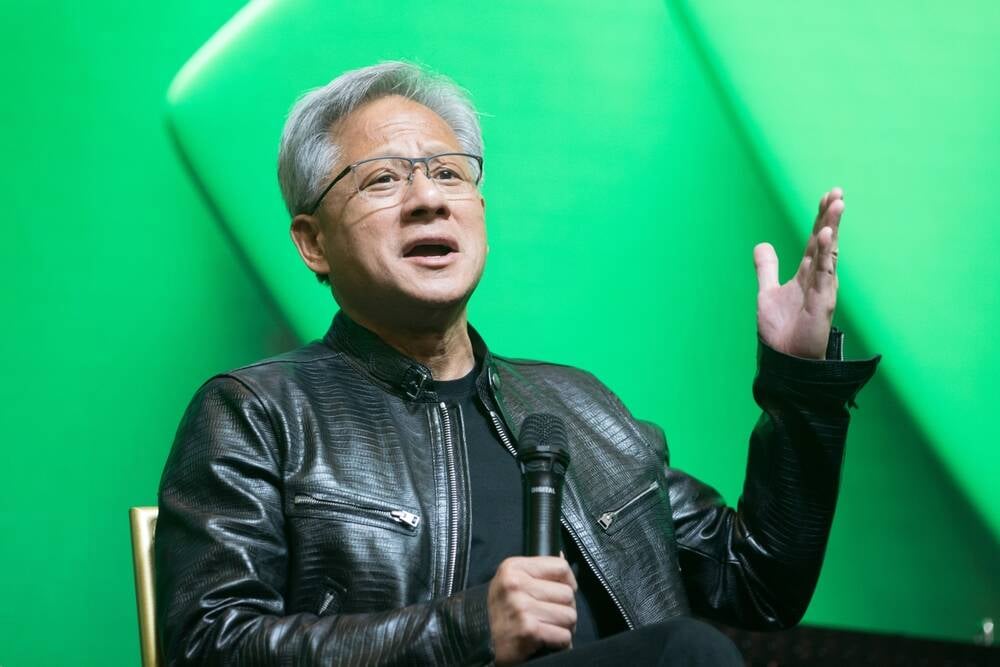Nvidia CEO Whines Europeans Arent Buying Enough GPUs

European nations need to invest more in artificial intelligence if they want to close the gap between the US and China, Nvidia CEO Jensen Huang said during a visit to Copenhagen on Wednesday to inaugurate Denmark's shiny new Gefion supercomputer.
"The EU has to accelerate the progress in AI," he said, according to Reuters. "There's an awakening in every country realizing that the data is a national resource."
Naturally, Huang believes the vehicle for closing this gap is AI infrastructure, specifically Nvidia GPUs.
"What country can afford not to have this infrastructure," he said during a fireside chat. "Just as every country realized you need to have communications, transportation, healthcare, fundamental infrastructure, the fundamental infrastructure of any country surely must be the manufacturing of intelligence."
During the roughly 30-minute chat, Jensen extolled the potential for generative AI technologies to drive the development of new technologies, particularly in biology and drug discovery — a key focus for Danish pharmaceutical giant Novo Nordisk, which is funding Gefion's deployment.
"The era of computer-aided drug discovery must be within this decade," Huang said in a statement.
Named after a Danish goddess, the system is based on Nvidia's nearly two-year-old DGX H100 SuperPOD architecture, and is equipped with 191 nodes containing a total of 1,528 H100 GPUs. As conventional supercomputers go, the system is among the top 20 most powerful systems in the world, at least on paper anyway. With peak FP64 performance of 102 petaFLOPS, the system should slot in between the number 14 ranked Perlmutter and Nvidia's own Selene supercomputer in 15th place on the latest Top500 ranking.
However, Gefion is billed as Denmark's "largest sovereign AI supercomputer," which means it is likely to spend a lot more time running at far lower precision. At FP8 the machine boasts roughly 6 exaFLOPS of sparse AI performance, though for training, the system is more likely to use dense 16-bit data types. At that precision the system is still quite powerful claiming 1.5 exaFLOPS of total system performance.
For Denmark, the machine, operated by the Novo Nordisk-backed Danish Center for AI Innovation, will be used to study everything from quantum computing and infectious disease, to climate change and food security.
For Nvidia, the system appears to be a sales pitch to other European nations about the value of "sovereign AI."
"Having a supercomputer on national soil provides a foundation for countries to use their own infrastructure as they build AI models and applications that reflect their unique culture and language," the GPU giant wrote in a blog post on Wednesday.
- 41-million-digit prime crunched by datacenter GPUs
- Amazon makes $500M bet on itty-bitty nuclear reactors to fuel cloud empire
- Uncle Sam reportedly considers capping AI chip shipments to Middle East
- AMD targets Nvidia H200 with 256GB MI325X AI chips, zippier MI355X due in H2 2025
Huang's emphasis on Europe comes as Nvidia faces waning prospects in China amid the Middle Kingdom's ongoing trade war with the US.
Nvidia has for years been blocked from selling its most powerful GPUs to China. The GPU maker has gone to great lengths to comply with US export rules, including developing specialized accelerators designed to limbo under Commerce Department performance caps on multiple occasions.
However, unless those performance caps are indexed, Nvidia's competitiveness in China will eventually erode as domestic alternatives catch up. In fact, the US could enact even stiffer restrictions on the sale of accelerators to the country after it was revealed this week that Huawei had used back channels to manufacture its homegrown accelerators at TSMC in violation of sanctions. ®
From Chip War To Cloud War: The Next Frontier In Global Tech Competition
The global chip war, characterized by intense competition among nations and corporations for supremacy in semiconductor ... Read more
The High Stakes Of Tech Regulation: Security Risks And Market Dynamics
The influence of tech giants in the global economy continues to grow, raising crucial questions about how to balance sec... Read more
The Tyranny Of Instagram Interiors: Why It's Time To Break Free From Algorithm-Driven Aesthetics
Instagram has become a dominant force in shaping interior design trends, offering a seemingly endless stream of inspirat... Read more
The Data Crunch In AI: Strategies For Sustainability
Exploring solutions to the imminent exhaustion of internet data for AI training.As the artificial intelligence (AI) indu... Read more
Google Abandons Four-Year Effort To Remove Cookies From Chrome Browser
After four years of dedicated effort, Google has decided to abandon its plan to remove third-party cookies from its Chro... Read more
LinkedIn Embraces AI And Gamification To Drive User Engagement And Revenue
In an effort to tackle slowing revenue growth and enhance user engagement, LinkedIn is turning to artificial intelligenc... Read more

